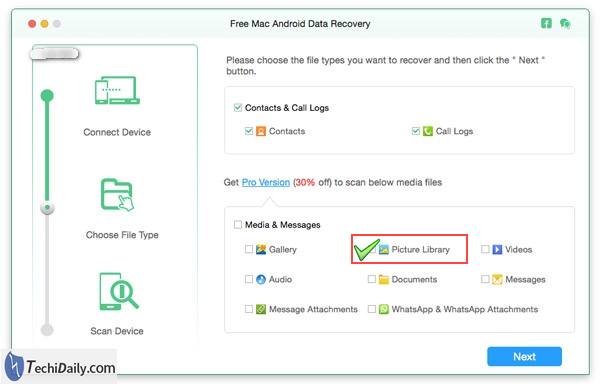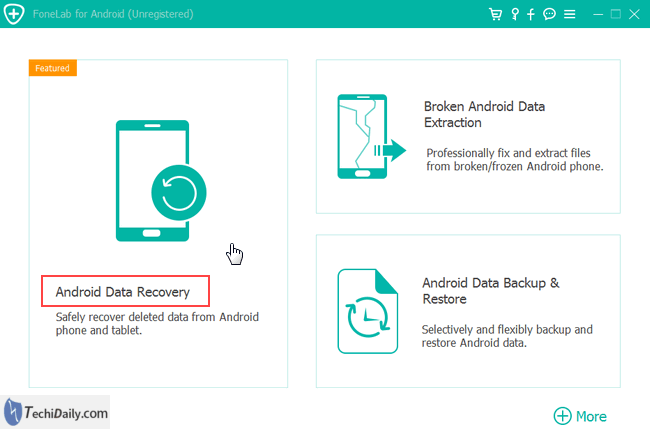How to Rescue Lost Photos from Pixel 8?

It is completely normal to accidentally delete the photos of a friend or family. Or when the virus has attacked your Google Pixel 8 system, all data, including the photos stored in the phone is subject to be damaged. When the photos is lost for some reason, they are obliged to collect them through every means they can imagine sweetly with tiny outcomes. Otherwise, they just stand to bear the loss and inconvenience caused by the loss of photos.
Android Data Recovery allows you to solve photos files loss problems for free within simple steps. No matter you are a beginner or expert, you can easily apply this software to recover your lost photos files.
If you have lost your photos, phone numbers, favorite songs, videos while formatting your Google Pixel 8 and looking for a solution, here is a file recovery software for Android phones. It retrieves all kinds of files from Google Pixel 8 in a simple and easy way.
- Part 1: How to Rescue Lost Photos from Pixel 8? (on macOS)
- Part 2: How to Rescue Lost Photos from Pixel 8? (on Windows)
Step 1: Download and launch the Android Data Recovery on Mac
Download and install the Android Data Recovery on your Mac computer, when you open it, a dialog box will pop up to remind you whether to register, purchase or free try.

Step 2: Connection
Run this powerful Android data recovering software on your Mac computer, and then connect your Google Pixel 8 device to computer via the USB cable. The program will detect your device automatically.
Step 3: Enable USB debugging.
Android Data Recovery will prompt you to enable USB debugging on your Google Pixel 8, if you don’t open the debugging mode. The program will detect the version of your Google Pixel 8 automatically and give you the instruction of opening the USB debugging mode on your Google Pixel 8. After finishing the operations on your device, click “OK” button.
Step 4: Select the photos you want to recover.
After connection, all file types on your Google Pixel 8 will be showed in the interface. Choose the file types you want to recover, such as contacts, messages, messages attachments, call logs, photos, gallery, picture library, videos, audios and other documents. Check the file types you want to recover and click Next. The program will scan your device automatically.
Step 5: click “Recover” button to complete recovering Google Pixel 8’s photos
When the scanning is finished, all types of files will be listed in categories on the left control. You are allowed to check the detailed information of each data. Preview and select the data you want to recover, and then click “Recover” button to complete recovering process.
Step 1: Download and launch the Android Data Recovery
Download and install the Android Data Recovery on your Windows computer.
Step 2: Connection
Connect your Google Pixel 8 device to your Windows computer via the USB cable. Wait for seconds before the device is detected. Install the device driver on your computer if it hasn’t been installed.
Step 3: Enable USB debugging.
Allow USB debugging when your Android prompts you of USB debugging permission. After finishing the operations on your Google Pixel 8 device, click “OK” button.
Step 4: Preview and recover the Google Pixel 8’s lost photos.
Soon, all Android available files will be classified into category on the left. You can toggle the button of “Only display the deleted item(s)” to “On”, so that you can quickly find the wanted Android file. Click “Recover” button and choose a destination folder to recover files. Within seconds, you can navigate to the file folder and check your deleted files from Google Pixel 8.
Finished! Android Data Recovery is a powerful and useful tool to help you recover all lost photos back on your Google Pixel 8 in a simple and secure way.
- Title: How to Rescue Lost Photos from Pixel 8?
- Author: Nova
- Created at : 2024-08-20 19:07:54
- Updated at : 2024-09-25 23:57:17
- Link: https://blog-min.techidaily.com/how-to-rescue-lost-photos-from-pixel-8-by-fonelab-android-recover-photos/
- License: This work is licensed under CC BY-NC-SA 4.0.
